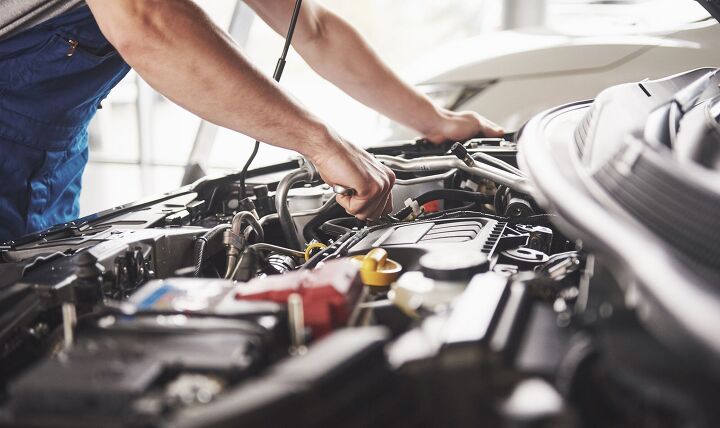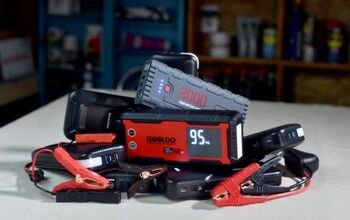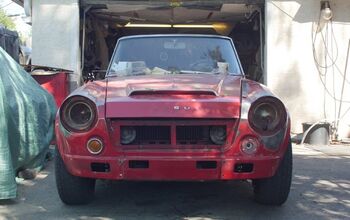Basic Hand Tools You Need To Work On Cars

Uh-oh, your car’s battery is dead, the brakes are squealing or a taillight bulb just burned out.
Your first instinct might be to schedule a service appointment at the local dealership or independent repair shop and hope the bill doesn’t send you into bankruptcy. Minor issues like these, however, are generally easy to repair if you have the right tools, even for drivers with little experience turning wrenches.
The good news is you can get much of what you need to work on cars without spending a fortune. Here are five of the most important basic hand tools for doing vehicle maintenance and making simple repairs.
A Good Set of Wrenches
No toolbox is complete without a good set of wrenches. These tools allow you to easily remove and install various nuts and bolts—well, easily if things aren’t as rusty as the Titanic. Manufacturers will occasionally sell individual wrenches, which can be helpful if you lose or break one, but for novice mechanics, it’s best to get a set.
When purchasing wrenches, you have an important choice to make. Do you get a standard set (measured in inches) or go metric? Ideally, it’s best to get both if you can afford to, as you’ll be well-equipped to work on just about anything, but if you can only afford one, metric is probably the better choice.
This is because practically every modern vehicle is built using the metric system. Also, when shopping for wrenches, look for a set with both open and boxed ends. This gives you greater flexibility for accessing various fasteners.
32-Piece Combination Wrench Set: SAE and Metric
Sockets and Ratchets
Similarly, ratchets and sockets are critical for working on cars and trucks. These tools are tailor-made for each other, meaning you really can’t get anything done if you don’t have both. The sockets, which come in various sizes, attach to ratchets, the part that looks like a handle. Not surprisingly, the ratchet contains a ratcheting mechanism that allows you to easily install or remove fasteners without having to reposition the tool with every turn.
When shopping for ratchets and socket sets, there are a few important factors to consider. One is metric vs. imperial, and again, metric is probably the better choice in the 21st century. Two, you should aim to get a bundled set of ratchets and sockets, a kit that includes a range of different socket sizes. This gives you greater flexibility and is critical because, as mentioned, a ratchet is useless without any sockets, and vice versa.
Third, pay attention to the ratchet drive end. They come in several different sizes, though, for light-duty automotive work, you only really have to worry about three options. Quarter-inch drive ratchets and sockets are perfect for small jobs in tight spaces, think interior trim and the like. Next, 3/8-inch drive sockets are a little beefier and are perfect for a huge variety of jobs. And finally, ½-inch drive is intended for heavier work, like brake caliper bolts or lug nuts. If you can get all three, great! If not, a 3/8-inch drive is probably the most versatile.
DEWALT Mechanics Socket Set, 1/4" & 3/8" Drive
Screwdrivers
Another critical tool to have for working on cars is a decent range of screwdrivers. These tools are – surprise, surprise – ideal for removing and installing screws, but they’re also helpful for light-duty prying, such as pulling a piece of trim out of the way, or for separating stubborn vehicle components like a stuck thermostat housing.
When shopping for a set of screwdrivers, look for one with a smattering of different sizes, as not every screw head is the same. Also, make sure to get a kit with both Phillips and slotted drivers, the two most common types of screw head you’re likely to encounter when working on a car. A small range of Torx screwdrivers can also be useful, especially in common, T20, T25, and T30 sizes.
CRAFTSMAN 8-Piece Screwdriver Set
A Few Good Pliers
Next up, pliers. You can’t make many automotive repairs without at least a few of these tools. There are many, many different types of pliers, but for basic vehicle work, you can probably get away with just three.
Needle nose pliers are versatile and ideal for getting in tight spaces. Adjustable-jaw pliers – Channellock is a well-known brand – work well for larger jobs, plus you can change how big a bite the tool takes, which makes them super useful. And finally, a nice set of lineman’s pliers is great to have. These are very sturdy, have a broad, square nose and often include a section at the rear of the jaws that allows you to cut wire.
Of course, if you want more for your toolbox, there are many other options. Slip-joint, wire-stripping, locking, and angled needle-nose are just a few of the other plier types that are available – and handy to have in certain situations. Don't forget the side cutters as well!
IRWIN VISE-GRIP 4-Piece Pliers Set
Allen Wrenches, Too
And finally, another important tool to have in your repertoire is a set of Allen wrenches (also known as hex keys). Think of these as the inverse of wrenches and sockets. Those tools work on nuts and bolts, which have six-sided heads; Allen keys, in comparison, are for bolts with an internal hex, the tool fits inside the head of the bolt rather than around the outside.
When shopping for Allen wrenches, it’s best to buy two sets: standard and metric. These tools are generally quite affordable, so this shouldn’t be a big issue for many people. Also, practically speaking, the only way to remove an Allen-head bolt is with the appropriate hex key. Trying to do this with a pair or pliers or something else is a nightmare, so splurge and get a set of standard and metric Allen wrenches. You’ll thank me later.
Hex keys can also be found as sockets, meaning they'll work with your ratchet when access is an issue, or extra force and speed is required.
Eklind Allen Key Combo Set: SAE and Metric
Yes, You Can Do It!
If you’ve got ambition and a little curiosity, you can perform basic vehicle maintenance and make simple repairs yourself.
Yes, you’ll need some equipment to do this, but spending a little money on a few hand tools is a smart investment that could save you thousands of dollars in the long run, so give it a try!
Become an AutoGuide insider. Get the latest from the automotive world first by subscribing to our newsletter here.

Born and raised in metro Detroit, Craig was steeped in mechanics from childhood. He feels as much at home with a wrench or welding gun in his hand as he does behind the wheel or in front of a camera. Putting his Bachelor's Degree in Journalism to good use, he's always pumping out videos, reviews, and features for AutoGuide.com. When the workday is over, he can be found out driving his fully restored 1936 Ford V8 sedan. Craig has covered the automotive industry full time for more than 10 years and is a member of the Automotive Press Association (APA) and Midwest Automotive Media Association (MAMA).
More by Craig Cole










































Comments
Join the conversation
Excellent article, Craig! I've been doing amateur repairs for 68 years and your article is perfect advice for all DYI-ers. Buy wobble extensions when you need an extension. There's one fabulous new tool available at Harbor freight. A year ago it was ten bucks. It is a double headed, extendable 1/4 & 3/8 inch finely geared ratchet. It enters breaker bar service when extended. The second tool to look for if you can find one is a WWII vintage thin two headed crescent wrench; about 6 inches long and adjusts up to one inch. Now, about the computer crap..... Avoid automobiles built after 2006. They're intentionally designed to complicate repairs. New automobile components should be entirely modular, easily accessed (plug&play), cheap and yet durable, but the automobile industry wants ALL your money all the time, forever! aka., rent. If no one would accept this crap, then we would be driving customizable, upgradable automobiles that, like a home could last a lifetime.